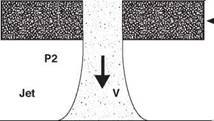 FRICTIONAL PRESSURE DROP ACROSS THE BIT
FRICTIONAL PRESSURE DROP ACROSS THE BIT
A schematic of incompressible flow through a short constriction, such as a bit nozzle, is shown in Figure 15. In practice, it is generally assumed that:
1. the change in pressure due to a change in elevation is negligible.
2. the velocity vo upstream of the nozzle is negligible, compared with the nozzle velocity vn
3. the frictional pressure loss across the nozzle is negligible.
The pressure loss across a nozzle is given by:
P1-8.074×10-4p v2n=p2 Equation 31 Pressure below a nozzle
|
Equation 32 Theoretical Nozzle Velocity |
|
where, APb = Pressure Loss across the nozzle (psi) p = Density of the Fluid (ppg) vn = velocity of discharge (feet per second) |
In field units of psi, ppg, fps and ft and substituting the symbol APb for the pressure drop (P1 — P2) and solving this equation for the nozzle velocity vn yields:
|
|
|
|
Drilling Fluid
|
|
|
P1 |
|
z |
|
Figure 15 Discharge Through a Nozzle |
|
Bit Nozzle |
|
Bottom of Hole |
The exit velocity predicted by Equation 32 for a given pressure drop across the bit, APb, is never realised. The actual velocity is always smaller than the velocity computed using Equation 32 primarily because the assumption of frictionless flow is not strictly true. To compensate for this difference, a correction factor or discharge coefficient Cd is usually introduced so that the modified equation:
|
|
Equation 33 Nozzle Velocity including Coefficient of Discharge
will result in the observed value for nozzle velocity. The discharge coefficient may be as high as 0.98 but the recommended value is 0.95.
A rock bit has more than one nozzle, usually having the same number of nozzles as cones. When more than one nozzle is present, the pressure drop applied across all of the nozzles must be the same. If the pressure drop is the same for each nozzle, the velocities through all nozzles are equal. In field units, the nozzle velocity, vn is given by:
|
v |
|
n |
3.117A,
Equation 34 Total Velocity through Nozzles
where vn has units of feet per second, q has units of gallons per minute, and At has units of square inches. Combining Equations 33 and 34 and solving for the pressure drop across the bit, APb yields:
TOC o "1-5" h z -5 2
8.311×10 5pq2 ДРЬ = —
b 2 2
Cd At
Equation 35 Total Pressure Drop Across Nozzles
Since the viscous frictional effects are essentially negligible for flow through short nozzles, Equation 35 is valid for both Newtonian and non-Newtonian liquids.
Bit nozzle diameters are often expressed in 32nds of an inch. For example, if the bit nozzles are described as “12-13-13” this denotes that the bit contains one nozzle having a diameter of 12/32in. and two nozzles having a diameter of 13/32 in.

